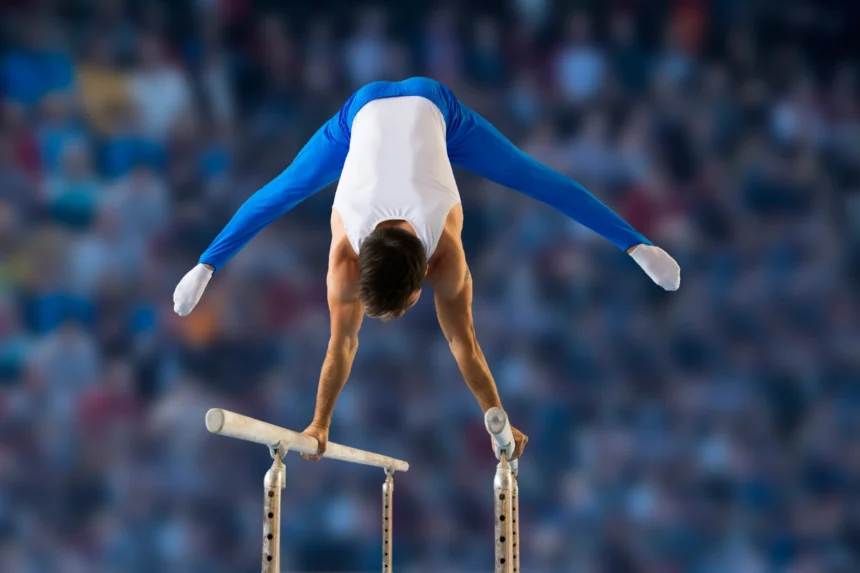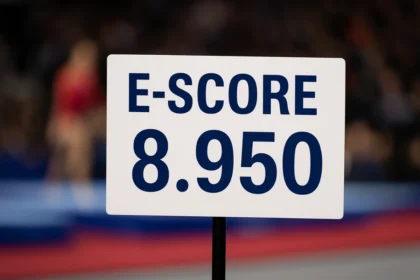In men’s gymnastics, perfection isn’t what it used to be. The classic “Perfect 10” is now a thing of the past. Since 2006, the sport has used an open-ended scoring system—one that values both high-flying difficulty and near-flawless execution. But if 10.000 is no longer the cap, then what qualifies as a “perfect” score today?
From Perfect 10 to Open-Ended Scoring
Since 2006, the International Gymnastics Federation (FIG) has split the final score into two parts:
- D-score (Difficulty): Open-ended. Calculated from the gymnast’s hardest skills, connections, and required elements.
- E-score (Execution): Starts at 10.000. Deductions are made for form errors, balance checks, steps, falls, and artistry issues.
Final Score = D-score + E-score – Neutral Deductions
There is no fixed “perfect” number anymore—just the best combination of sky-high difficulty and razor-sharp execution.
Difficulty Perfection vs. Execution Perfection
In today’s system, “perfection” is split into two ideals:
- Difficulty Perfection: Maxing out the D-score with the hardest skills, connections, and combinations.
- Execution Perfection: Protecting the E-score by performing every move with clean form, control, and stuck landings.
The best routines hit both targets—but it’s rare.
What Is a “Perfect” D-Score?
Under the 2025–2028 FIG Code, a gymnast’s D-score includes:
- Their 8 most difficult elements (except vault),
- Bonus points from connections,
- All required composition elements.
Gymnasts must build high D-scores strategically—piling on difficulty only works if the skills can be linked cleanly.
| Apparatus | Modern “Perfect” D | What It Takes |
|---|---|---|
| Vault | 5.6 (max) | Doing the hardest vaults, like the Ri Se Gwang. |
| Parallel Bars | ~6.9 | Release moves, Bhavsar transitions, and high-value connections. |
| Still Rings | 6.7–6.9 | Maltese holds, swing-to-handstand combos, no breaks. |
| Pommel Horse | 6.6–6.9 | Fast circles, hard travels, and bonuses for connection series. |
| High Bar | 6.6–6.7 | Big releases like Cassina and Kolman, plus high-difficulty combos. |
| Floor | 6.6–6.8 | Powerful tumbling (e.g. triple twist), clean pass connections. |
On vault, the value is fixed at a maximum of 5.6 per vault. There’s no bonus—only execution can raise the final score.
What Is a “Perfect” E-Score?
The Execution score starts at 10.000, with deductions taken for:
- Bent knees
- Leg separations
- Wobbles
- Unpointed toes
- Poor landings
In modern competitions—where judges use slow-mo video and strict deduction rules—getting close to 9.000 is already exceptional.
| Apparatus | Modern “Perfect” E | What It Takes |
|---|---|---|
| Vault | 9.20+ | Sticking a 5.6 vault with clean pre-flight and tight form. |
| Parallel Bars | 9.10+ | No leg separation, perfect handstands, and a stuck dismount. |
| Still Rings | 9.00+ | Textbook strength holds and no shoulder movement. |
| Floor | ~8.80+ | Clean tumbling, sharp dance, no hops. |
| Pommel Horse | ~8.80+ | Constant rhythm, high amplitude, and no form breaks. |
| High Bar | ~8.80+ | High catches, controlled swing, and precise regrasp. |
What’s a “Perfect” Final Score Today?
While there’s no longer a “10,” some routines come close to perfection in terms of total score.
| Apparatus | Typical Elite Max | Why It’s Considered “Perfect” |
|---|---|---|
| Vault | ~15.6–16.2 | Max D (5.6) + stuck landing = very high final score. |
| Parallel Bars | ~15.5–16.0 | High D with 9.0+ execution and clean transitions. |
| Still Rings | ~15.5–16.2 | Powerful holds, solid swing, and clean form. |
| Floor | ~15.2–15.8 | Difficult tumbling + controlled landings. |
| Pommel Horse | ~15.3–15.9 | Complex travel sequences with rhythm and no visible breaks. |
| High Bar | ~15.3–15.9 | Big releases, stuck landing, and sharp execution. |
💡 16.0+ scores are rare, but possible when both D and E are top-tier.
Highest Single-Routine Scores in Men’s Gymnastics
These routines are examples of just how close gymnasts have come to modern perfection:
| Apparatus | Score | Gymnast & Event | D / E Split |
|---|---|---|---|
| Vault (single) | 16.800 | Marian Drăgulescu – 2008 Olympics (QF) | 7.0 / 9.8 |
| Still Rings | 16.650 | Chen Yibing – 2008 Olympics (Final) | ~7.0+ / 9.6 |
| High Bar | 16.533 | Epke Zonderland – 2012 Olympics (Final) | 7.2 / 9.333 |
| Parallel Bars | 16.475 | Huang Xu – 2008 Olympics (Final) | ~7.0+ / 9.0+ |
| Floor | 16.133 | Kenzo Shirai – 2016 Olympics (Final) | 6.6 / 9.533 |
| Pommel Horse | 16.100 | Xiao Qin – 2008 Olympics (Final) | ~6.8 / 9.3 |
Note: Vault finals average two vaults, but Drăgulescu’s 16.800 is the highest single vault ever.
Highest All-Around Totals in Men’s Gymnastics
These are the best all-around totals ever recorded under the open Code (2006–present):
| Total | Gymnast | Event | D / E Breakdown | Why It’s Notable |
|---|---|---|---|---|
| 94.575 | Yang Wei (CHN) | 2008 Olympics | ~40.8 D + 53.8 E | The highest AA score ever. Stuck 5 of 6 routines with elite execution. |
| 93.631 | Kohei Uchimura (JPN) | 2011 World Championships | ~40.1 D + 53.5 E | Best post-2009 score after D-value cuts. |
| 92.332 | Kohei Uchimura (JPN) | 2015 World Championships | ~38.8 D + 53.5 E | Final peak before newer difficulty downgrades. |
| 86.832 | Shinnosuke Oka (JPN) | 2024 Olympics | ~33.0 D + 53.8 E | Best of the current era. Reflects lower D caps in 2025–2028 cycle. |
Final Thought
The “Perfect 10” may be gone, but perfection is still alive in gymnastics—it just looks different.
Today’s “perfect” routines are defined by:
- ✅ World-class difficulty (D-score in the top 10%)
- ✅ Near-flawless execution (E-score of 9.0+)
- ✅ Smart, clean composition with no room for wasted effort
- ✅ Control under pressure, sticking landings and maintaining rhythm throughout
True perfection may be unreachable, but every cycle, elite gymnasts come closer—one skill, one stuck landing, one tenth at a time.












